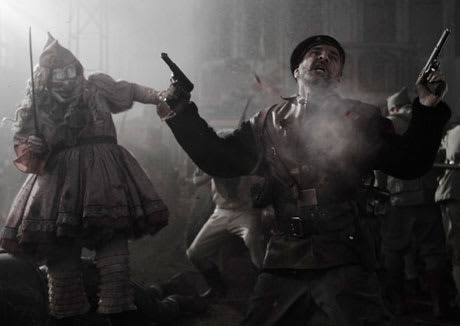The characters of The Last Circus inhabit a nightmarish world where the duality between good and evil is impossible to navigate. The film centres upon a sad clown, Javier (Carlos Areces), who suffered an immense tragedy as a young boy in 1937: watching his father get brutally murdered by members of the Franco party in Spain. Before his father takes his final breath, he instructs Javier to take revenge. The film shifts its temporality and we're situated in 1973, where Javier has entered the employ of a circus as the sad clown; he is seemingly docile, an outsider. However, Javier is soon introduced to the happy clown, Sergio (Antonio de la Torre), but this façade of happiness is a lie, as we learn of his tyrannical ways and savage sadism. Javier unfortunately falls in love with Sergio's wife, Natalia (Carolina Bang), a beautiful, seductive circus acrobat who allows her sadomasochistic relationship with Sergio to thrive. The violence directed towards Natalia by her misogynistic husband is at once disturbing and unnecessary. Natalia manages to seduce the naïve Javier, initiating him into the world of sexual fantasy and violence. This perversion of Javier has tremendous consequences, as he unleashes a reign of carnage. After attempting to save Natalia from her abusive marriage and almost killing Sergio after a brawl at a carnival, Jaiver goes on the run from the circus folk and members of the Franco party, after whom he sought vengeance. He's eventually captured by the Franco party, but not for long, finally embodying his psychotic killer persona by disfiguring his face and body so that he appears permanently as a sad clown, then wreaking havoc on those holding him hostage. The film takes Bahktin's notion of the "carnival-esque" to otherworldly proportions. Half of the time it seems as though Javier exists in a hellish realm in which only outlandish and fantastical people live. The gore and killings are excessive, though the number of dismembered bodies and obscured faces heightens the grotesque setting and tone. It's difficult to relate to any one character, as there's no clear right or wrong in the situation. Javier has his revenge, but goes too far and loses himself in the process. The DVD features an interesting glimpse into the making of The Last Circus, with interviews with the actors and director. Antonio de La Iglesia compares his film to a Greek tragedy, which is a peculiar way of analyzing a work like this. There's also an in-depth look at the visual effects of the film, including green screen and set design.
(Mongrel Media)The Last Circus
Alex de la Iglesia

BY Lauren TreihaftPublished Nov 2, 2011